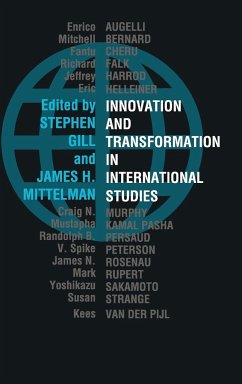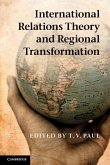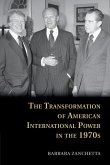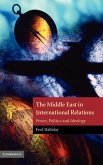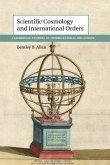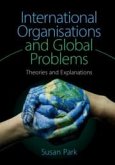Stephen Gill / H. Mittelman (eds.)
Innovation and Transformation in International Studies
Herausgeber: Gill, Stephen; Mittelman, James H.
Stephen Gill / H. Mittelman (eds.)
Innovation and Transformation in International Studies
Herausgeber: Gill, Stephen; Mittelman, James H.
- Gebundenes Buch
- Merkliste
- Auf die Merkliste
- Bewerten Bewerten
- Teilen
- Produkt teilen
- Produkterinnerung
- Produkterinnerung
This book explores the nature of, and conditions for, theoretical innovation in international studies.
Andere Kunden interessierten sich auch für
![International Relations Theory and Regional Transformation International Relations Theory and Regional Transformation]() International Relations Theory and Regional Transformation34,99 €
International Relations Theory and Regional Transformation34,99 €![The Transformation of American International Power in the 1970s The Transformation of American International Power in the 1970s]() Barbara ZanchettaThe Transformation of American International Power in the 1970s26,99 €
Barbara ZanchettaThe Transformation of American International Power in the 1970s26,99 €![The Evolution of International Security Studies The Evolution of International Security Studies]() Barry BuzanThe Evolution of International Security Studies140,99 €
Barry BuzanThe Evolution of International Security Studies140,99 €![The Middle East in International Relations The Middle East in International Relations]() Halliday FredThe Middle East in International Relations129,99 €
Halliday FredThe Middle East in International Relations129,99 €![Scientific Cosmology and International Orders Scientific Cosmology and International Orders]() Bentley B. AllanScientific Cosmology and International Orders37,99 €
Bentley B. AllanScientific Cosmology and International Orders37,99 €![Human Rights in International Relations Human Rights in International Relations]() David P. ForsytheHuman Rights in International Relations102,99 €
David P. ForsytheHuman Rights in International Relations102,99 €![International Organisations and Global Problems International Organisations and Global Problems]() Susan ParkInternational Organisations and Global Problems128,99 €
Susan ParkInternational Organisations and Global Problems128,99 €-
-
-
This book explores the nature of, and conditions for, theoretical innovation in international studies.
Hinweis: Dieser Artikel kann nur an eine deutsche Lieferadresse ausgeliefert werden.
Hinweis: Dieser Artikel kann nur an eine deutsche Lieferadresse ausgeliefert werden.
Produktdetails
- Produktdetails
- Verlag: Cambridge University Press
- Seitenzahl: 318
- Erscheinungstermin: 3. Dezember 2014
- Englisch
- Abmessung: 235mm x 157mm x 22mm
- Gewicht: 613g
- ISBN-13: 9780521591058
- ISBN-10: 0521591058
- Artikelnr.: 26702394
- Herstellerkennzeichnung
- Books on Demand GmbH
- In de Tarpen 42
- 22848 Norderstedt
- info@bod.de
- 040 53433511
- Verlag: Cambridge University Press
- Seitenzahl: 318
- Erscheinungstermin: 3. Dezember 2014
- Englisch
- Abmessung: 235mm x 157mm x 22mm
- Gewicht: 613g
- ISBN-13: 9780521591058
- ISBN-10: 0521591058
- Artikelnr.: 26702394
- Herstellerkennzeichnung
- Books on Demand GmbH
- In de Tarpen 42
- 22848 Norderstedt
- info@bod.de
- 040 53433511
Part I. Rethinking Remaking the Roots of Global Social and Political
Theory: 1. Transformation and innovation in the study of world order
Stephen Gill; 2. Consciousness, myth and collective action: Gramsci, Sorel
and the ethical state Enrico Augelli and Craig N. Murphy; 3. Critical
realism and the demystification of interstate power E. H. Carr, Hedley Bull
and Robert W. Cox Richard Falk; 4. Ibn Khaldun and world order Mustapha
Pasha; Part II. Political Economy: the Social and Ecological Anatomy of
Transformation: 5. Ecology, political economy and the counter-movement:
Karl Polanyi and the second great transformation Mitchell Bernard; 6.
Braudelian reflections on economic globalisation: the historian as pioneer,
Eric Helleiner; 7. Social forces and international political economy:
joining the two IRs Jeffrey Harrod; 8. Transnational class formation and
state forms Kees van der Pijl; Part III. Transformation, Innovation and
Emancipation in Global Political and Civil Society: 9. Globalisation and
contested common sense in the United States Mark Rupert; 10. The silent
revolution and the weapons of the weak: transformation and innovation from
below Fantu Cheru; 11. Frantz Fanon, decolonisation and the emerging world
order Randolph Persaud; 12. Whose crisis? Early and post-modern masculinism
V. Spike Peterson; Part IV. Reflections on Global Order in the Twenty-First
Century: 13. Civil society and democratic world order Yoshikazu Sakamoto;
14. Imposing global order: a synthesised ontology for a turbulent era James
N. Rosenau; 15. The problem or the solution? Capitalism and the state
system Susan Strange; 16. Rethinking innovation in international studies:
global transformation at the turn of the millennium James H. Mittelman.
Theory: 1. Transformation and innovation in the study of world order
Stephen Gill; 2. Consciousness, myth and collective action: Gramsci, Sorel
and the ethical state Enrico Augelli and Craig N. Murphy; 3. Critical
realism and the demystification of interstate power E. H. Carr, Hedley Bull
and Robert W. Cox Richard Falk; 4. Ibn Khaldun and world order Mustapha
Pasha; Part II. Political Economy: the Social and Ecological Anatomy of
Transformation: 5. Ecology, political economy and the counter-movement:
Karl Polanyi and the second great transformation Mitchell Bernard; 6.
Braudelian reflections on economic globalisation: the historian as pioneer,
Eric Helleiner; 7. Social forces and international political economy:
joining the two IRs Jeffrey Harrod; 8. Transnational class formation and
state forms Kees van der Pijl; Part III. Transformation, Innovation and
Emancipation in Global Political and Civil Society: 9. Globalisation and
contested common sense in the United States Mark Rupert; 10. The silent
revolution and the weapons of the weak: transformation and innovation from
below Fantu Cheru; 11. Frantz Fanon, decolonisation and the emerging world
order Randolph Persaud; 12. Whose crisis? Early and post-modern masculinism
V. Spike Peterson; Part IV. Reflections on Global Order in the Twenty-First
Century: 13. Civil society and democratic world order Yoshikazu Sakamoto;
14. Imposing global order: a synthesised ontology for a turbulent era James
N. Rosenau; 15. The problem or the solution? Capitalism and the state
system Susan Strange; 16. Rethinking innovation in international studies:
global transformation at the turn of the millennium James H. Mittelman.
Part I. Rethinking Remaking the Roots of Global Social and Political
Theory: 1. Transformation and innovation in the study of world order
Stephen Gill; 2. Consciousness, myth and collective action: Gramsci, Sorel
and the ethical state Enrico Augelli and Craig N. Murphy; 3. Critical
realism and the demystification of interstate power E. H. Carr, Hedley Bull
and Robert W. Cox Richard Falk; 4. Ibn Khaldun and world order Mustapha
Pasha; Part II. Political Economy: the Social and Ecological Anatomy of
Transformation: 5. Ecology, political economy and the counter-movement:
Karl Polanyi and the second great transformation Mitchell Bernard; 6.
Braudelian reflections on economic globalisation: the historian as pioneer,
Eric Helleiner; 7. Social forces and international political economy:
joining the two IRs Jeffrey Harrod; 8. Transnational class formation and
state forms Kees van der Pijl; Part III. Transformation, Innovation and
Emancipation in Global Political and Civil Society: 9. Globalisation and
contested common sense in the United States Mark Rupert; 10. The silent
revolution and the weapons of the weak: transformation and innovation from
below Fantu Cheru; 11. Frantz Fanon, decolonisation and the emerging world
order Randolph Persaud; 12. Whose crisis? Early and post-modern masculinism
V. Spike Peterson; Part IV. Reflections on Global Order in the Twenty-First
Century: 13. Civil society and democratic world order Yoshikazu Sakamoto;
14. Imposing global order: a synthesised ontology for a turbulent era James
N. Rosenau; 15. The problem or the solution? Capitalism and the state
system Susan Strange; 16. Rethinking innovation in international studies:
global transformation at the turn of the millennium James H. Mittelman.
Theory: 1. Transformation and innovation in the study of world order
Stephen Gill; 2. Consciousness, myth and collective action: Gramsci, Sorel
and the ethical state Enrico Augelli and Craig N. Murphy; 3. Critical
realism and the demystification of interstate power E. H. Carr, Hedley Bull
and Robert W. Cox Richard Falk; 4. Ibn Khaldun and world order Mustapha
Pasha; Part II. Political Economy: the Social and Ecological Anatomy of
Transformation: 5. Ecology, political economy and the counter-movement:
Karl Polanyi and the second great transformation Mitchell Bernard; 6.
Braudelian reflections on economic globalisation: the historian as pioneer,
Eric Helleiner; 7. Social forces and international political economy:
joining the two IRs Jeffrey Harrod; 8. Transnational class formation and
state forms Kees van der Pijl; Part III. Transformation, Innovation and
Emancipation in Global Political and Civil Society: 9. Globalisation and
contested common sense in the United States Mark Rupert; 10. The silent
revolution and the weapons of the weak: transformation and innovation from
below Fantu Cheru; 11. Frantz Fanon, decolonisation and the emerging world
order Randolph Persaud; 12. Whose crisis? Early and post-modern masculinism
V. Spike Peterson; Part IV. Reflections on Global Order in the Twenty-First
Century: 13. Civil society and democratic world order Yoshikazu Sakamoto;
14. Imposing global order: a synthesised ontology for a turbulent era James
N. Rosenau; 15. The problem or the solution? Capitalism and the state
system Susan Strange; 16. Rethinking innovation in international studies:
global transformation at the turn of the millennium James H. Mittelman.

